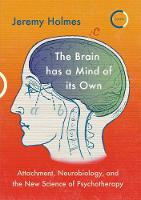The Brain has a Mind of its Own: Attachment, Neurobiology and the New Science of Psychotherapy

Book Details
- Publisher : Karnac Books
- Published : 2020
- Cover : Paperback
- Pages : 208
- Category :
Neuroscience - Category 2 :
Attachment Theory - Catalogue No : 95042
- ISBN 13 : 9781913494025
- ISBN 10 : 1913494020
Reviews and Endorsements
This book is a visionary tour de force. It will serve as a guide to every clinician’s thinking. It takes a significant step towards realizing Freud’s ambition of establishing a viable neuroscientific model for psychotherapy. It is one of the most valuable contributions to the field this Century.
Professor Peter Fonagy, OBE, Professor of Contemporary Psychoanalysis and Developmental Science, UCL
If Sigmund Freud were working now, he would be advising us to read this rich and thought-provoking new book. The examples are profound and beautiful; and Jeremy’s work is a reminder that psychotherapy will always be both an art and a science.
Dr Gwen Adshead, Consultant Forensic Psychiatrist and Psychotherapist
The Free Energy Principle is the cutting edge of modern neuroscience. It is also notoriously difficult to grasp. Here, Jeremy Holmes explains it in terms that psychotherapists can understand so easily that it feels as if we always understood it.
Professor Mark Solms, University of Cape Town
As one of the architects of the free energy principle, it was a true joy – and something of an eye opener – to see how mathematical intuitions can be artfully unpacked to explain our transactions with others. This book renders problems such as these in a new, grounded and revealing light.
Professor Karl J. Friston, Scientific Director, Wellcome Centre for Human Neuroimaging, Institute of Neurology, UCL
The meticulous research that has gone into this book and the clarity with which the concepts are expressed generated a feeling in me that what I had been reading was meaningful, important, and did indeed support the statement Holmes makes on the first page that “psychoanalysis still has much to contribute to our understanding of what it is to be human”.
Tamar Posner
Professor Holmes is doing something important here, which is to bring psychoanalysis up to date in the light of what is now known about how brains grow and change in complexity across the life span and in different environments and situations. [...] Jeremy Holmes has worked in the field of complex relational psychopathology for over thirty years and his experience and compassion shines through and illuminates theories that are not easy to follow. I liked this book before it was published and I like it now.
Gwen Adshead

